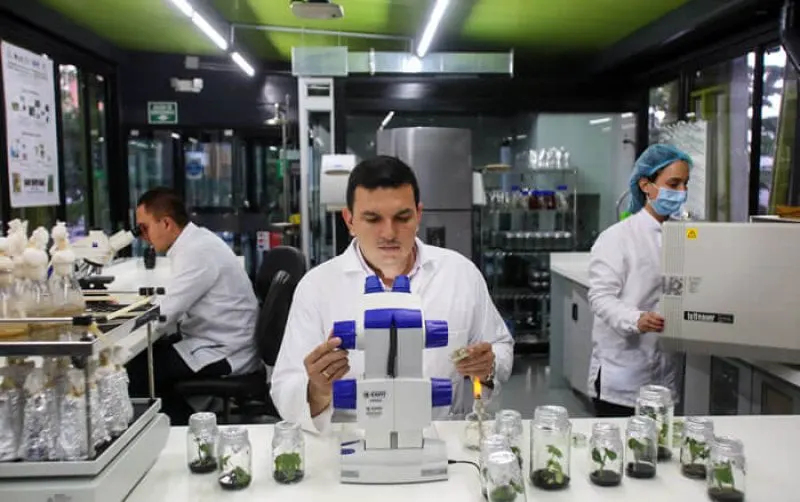Colombian university develops next-generation oil-producing transgenic crops
Colombian university develops next-generation oil-producing transgenic crops


In products as common as wine, beer, cotton, flowers and others from the food sector such as soybeans and corn, but also in pharmaceutical generation areas such as insulin or vaccines, you can find the technology of transgenesis. It is about the genetic modification of organisms (GMOs) or better known as transgenics, an issue on which EAFIT researchers have been working for six years with the aim of expanding the frontier of knowledge and contributing to issues such as agricultural production and food safety.
Since 2015, for example, EAFIT researchers began to work on the genetic improvement of the sacha inchi and the castor, two plants with high potential for the development of the Baja Cauca Antioqueño [a region of Colombia], since they contain fatty acids with industrial applications — in the case of the castor — and for human consumption, sacha inchi.
In order to develop transgenic seeds, which would help food sovereignty in the future, the academic sector can contribute to biotechnological development taking into account that each region of the planet has its varieties.
In this regard, [lead researcher Professor Diego Villanueva] highlights the contributions of transgenic research to achieve the objectives of sustainable development by recalling that global warming is an imminent challenge and agriculture suffers greatly from this phenomenon. “As the temperature increases, a fundamental resource such as water becomes scarce, as ecosystems heat up, pests also move around and many diseases appear because their vectors move,” he says.
[Editor’s note: This article was originally published in Spanish and has been translated and edited for clarity.]
Read the original post

 | Videos | More... |

Video: Nuclear energy will destroy us? Global warming is an existential threat? Chemicals are massacring bees? Donate to the Green Industrial Complex!
 | Bees & Pollinators | More... |

GLP podcast: Science journalism is a mess. Here’s how to fix it

Mosquito massacre: Can we safely tackle malaria with a CRISPR gene drive?

Are we facing an ‘Insect Apocalypse’ caused by ‘intensive, industrial’ farming and agricultural chemicals? The media say yes; Science says ‘no’
 | Infographics | More... |

Infographic: Global regulatory and health research agencies on whether glyphosate causes cancer
 | GMO FAQs | More... |

Why is there controversy over GMO foods but not GMO drugs?

How are GMOs labeled around the world?

How does genetic engineering differ from conventional breeding?
 | GLP Profiles | More... |

Alex Jones: Right-wing conspiracy theorist stokes fear of GMOs, pesticides to sell ‘health supplements’




 Trust issues: What happens when therapists use ChatGPT?
Trust issues: What happens when therapists use ChatGPT? Fighting deforestation with CO2: Biotechnology breakthrough creates sustainable palm oil alternative for cosmetics
Fighting deforestation with CO2: Biotechnology breakthrough creates sustainable palm oil alternative for cosmetics Viewpoint — Fact checking MAHA mythmakers: How wellness influencers and RFK, Jr. undermine American science and health
Viewpoint — Fact checking MAHA mythmakers: How wellness influencers and RFK, Jr. undermine American science and health Viewpoint: Video — Big Solar is gobbling up productive agricultural land and hurting farmers yet providing little energy or sustainabilty gains
Viewpoint: Video — Big Solar is gobbling up productive agricultural land and hurting farmers yet providing little energy or sustainabilty gains California, Washington, Oregon forge immunization alliance to safeguard vaccine access against federal undermining
California, Washington, Oregon forge immunization alliance to safeguard vaccine access against federal undermining 30-year-old tomato line shows genetic resistance to devastating virus
30-year-old tomato line shows genetic resistance to devastating virus The free-range chicken dilemma: Better for birds, but with substantial costs
The free-range chicken dilemma: Better for birds, but with substantial costs ‘You have to treat the brain first’: Rethinking chronic pain with Sanjay Gupta
‘You have to treat the brain first’: Rethinking chronic pain with Sanjay Gupta
